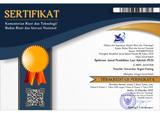The Effectiveness Of Using Ice Cream Stick Media In Increasing The Calculation Of Children Aged 5-6 Years Old In Nagari Muara Sakai Pesisir Selatan District
 ), Ismaniar Ismaniar(2),
), Ismaniar Ismaniar(2), (1) Universitas Negeri Padang
(2) Universitas Negeri Padang
 Corresponding Author
Corresponding Author
DOI : https://doi.org/10.24036/spektrumpls.v10i2.115099
Full Text:
 Language : en
Language : en
Abstract
Keywords: Ice cream stick media, Counting Ability
References
Ismaniar, I., & Utoyo, S. (2020). “Mirror of Effect” dalam Perkembangan Perilaku Anak pada Masa Pandemi Covid 19. Diklus: Jurnal Pendidikan Luar Sekolah, 4(2), 147–157.
Khadijah. (2016). Pengembangan Kognitif Anak Usia Dini. Medan: Perdana Publishing. https://doi.org/10.1016/S0262-8856(98)00132-2
Martono, N. (2015). Metode Penelitian Kuantitatif. Jakarta: Rajawali Pers.
Pamungkas, A. H., & Sunarti, V. (2018). Pengelolaan PAUD Berbasis Experiential Learning. KOLOKIUM: Jurnal Pendidikan Luar Sekolah, 6(2), 101–106. https://doi.org/10.24036/kolokium-pls.v6i2.16
Patmonodewo, S. (2013). Pendidikan Anak Prasekolah. Jakarta: Rineka Cipta.
Ridwan. (2007). Rumus dan Data dalam Analisis Statistika. Bandung: Alfabeta.
Rukajat, A. (2018). Pendekatan Penelitian Kuantitatif. Sleman: Deepublish Puplisher.
Sofiyatun, F. (2017). Diajukan sebagai salah satu syarat untuk memperoleh Gelar Sarjana Pendidikan Progam Studi Pendidikan Guru Pendidikan Anak Usia Dini.
Solfema, S., Wahid, S., & Pamungkas, A. H. (2018). Alat Permainan Edukatif (APE) Berbasis Bahan Lingkungan dalam Mengatasi Permasalahan Pembelajaran Pendidikan Anak Usia Dini. KOLOKIUM: Jurnal Pendidikan Luar Sekolah, 6(2), 107–111. https://doi.org/10.24036/kolokium-pls.v6i2.12
Subarinah, S. (2006). Inovasi Pembelajaran Matematika SD. Jakarta: Depdiknas.
Sudrajat, C. J., Agustin, M., Kurniawati, L., & Karsa, D. (2020). Strategi Kepala TK dalam Meningkatkan Mutu Pendidikan pada Masa Pandemi Covid 19. Jurnal Obsesi : Jurnal Pendidikan Anak Usia Dini, 5(1), 508. https://doi.org/10.31004/obsesi.v5i1.582
Sugiyono. (2016). Metode Penelitian Kuantitatif, Kualitatif, dan Kombinasi (Mixed Methods). Bandung: Alfabeta.
Sujiono. (2012). Bermain Kreatif Berbasis Kecerdasan Jamak. Jakarta: Indeks.
Syur’aini, S., Setiawati, S., & Sunarti, V. (2018). Penyusunan Program Parenting Bagi Pengelola dan Pendidik PAUD di Nagari Lubuk Jantan Kecamatan Lintau Buo Utara. Kolokium: Jurnal Pendidikan Luar Sekolah, 6(2), 112–118. https://doi.org/10.5281/zenodo.1471718
Utoyo, S. (2017). Metode Pengembangan Matematika Anak Usia Dini. Gorontalo: Ideas Publishing.
 Article Metrics
Article Metrics
 Abstract Views : 321 times
Abstract Views : 321 times
 PDF Downloaded : 120 times
PDF Downloaded : 120 times
Refbacks
- There are currently no refbacks.

This work is licensed under a Creative Commons Attribution-NonCommercial 4.0 International License.



